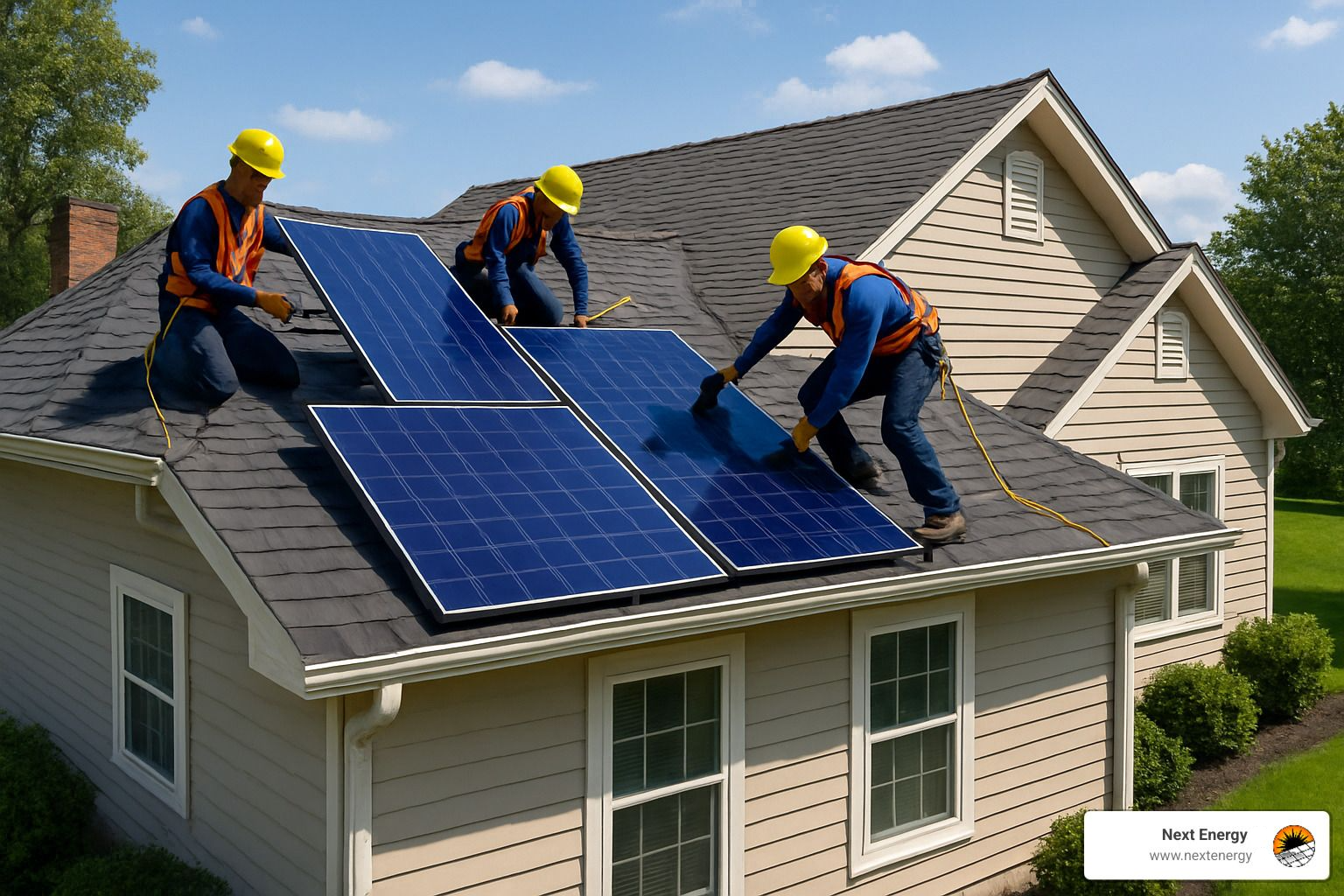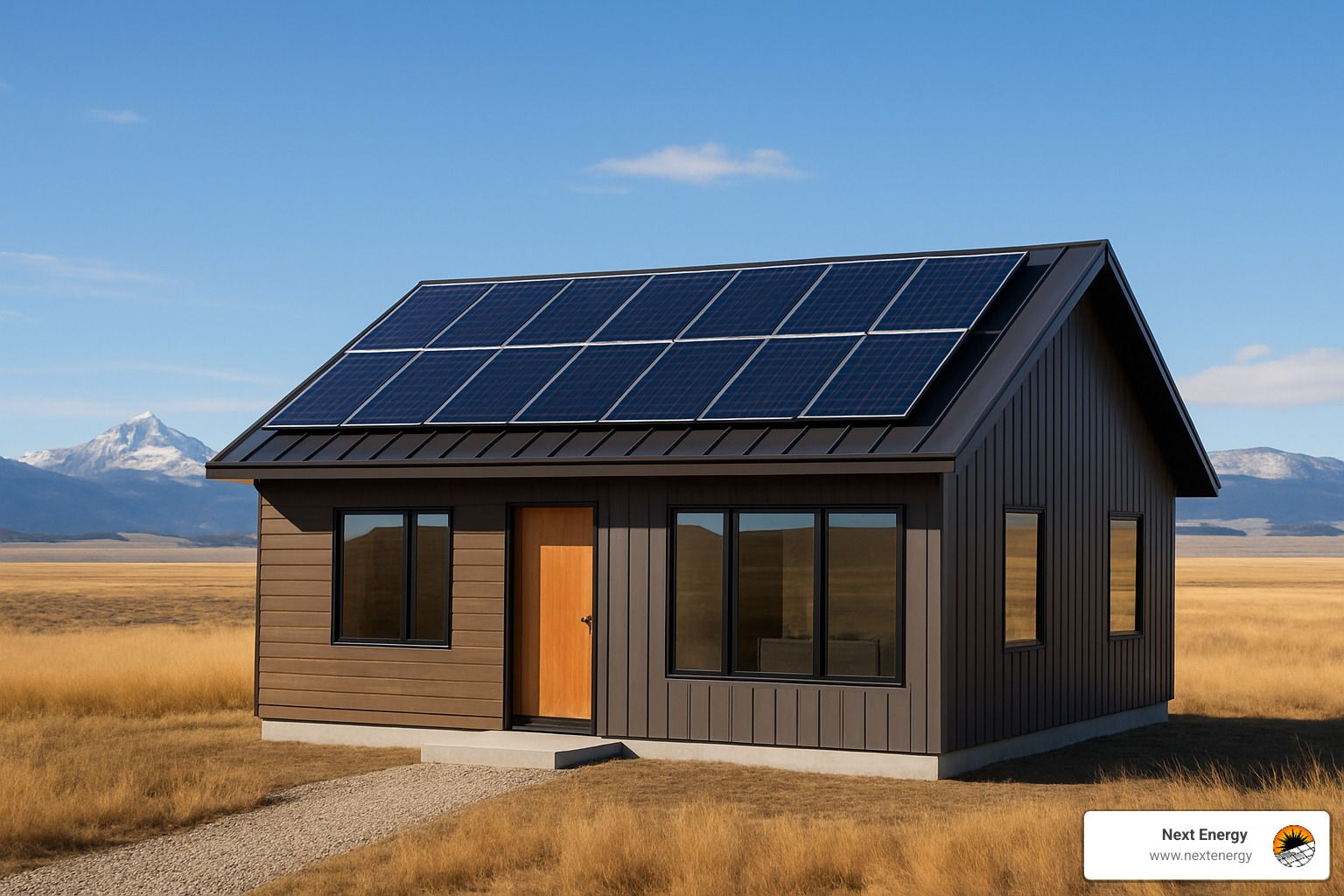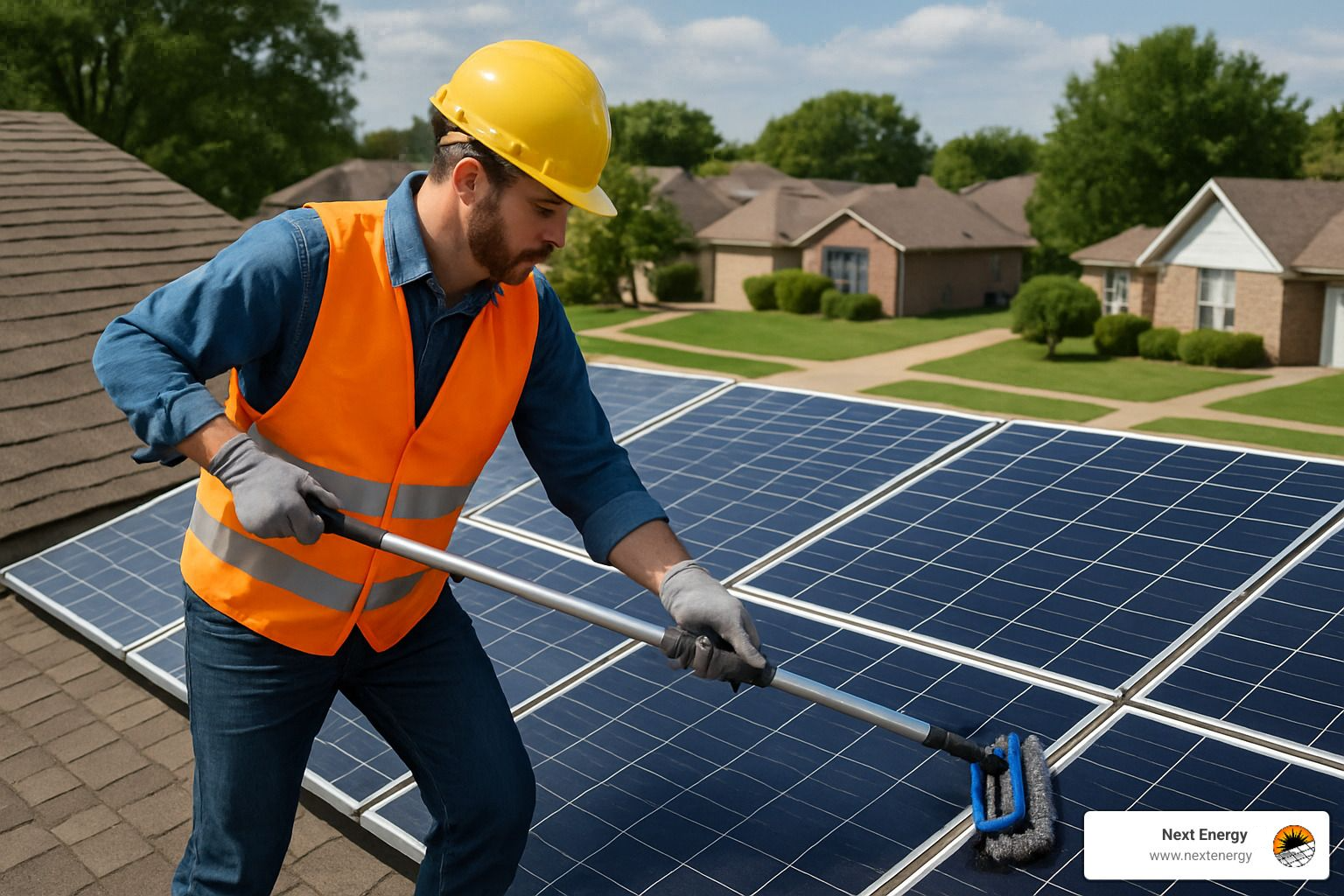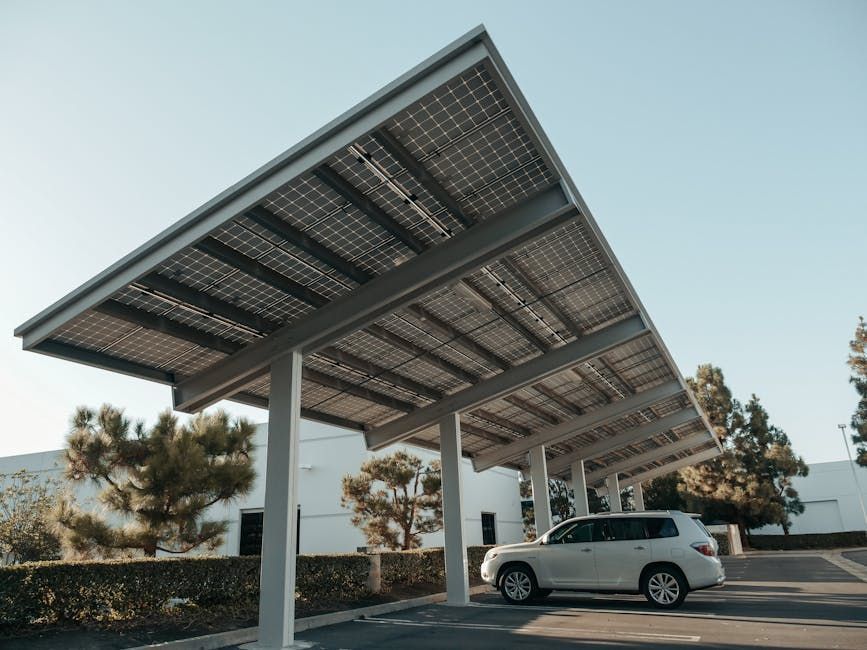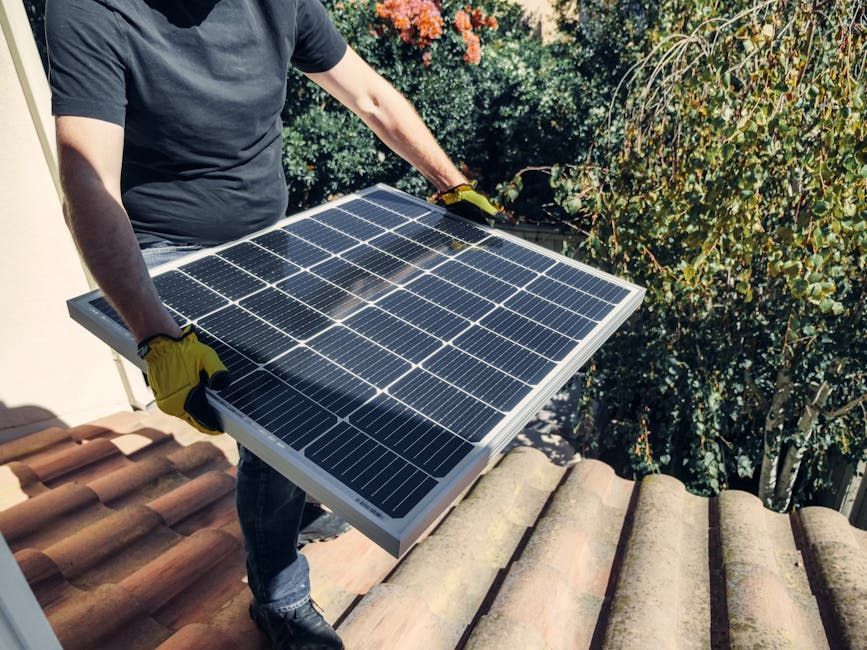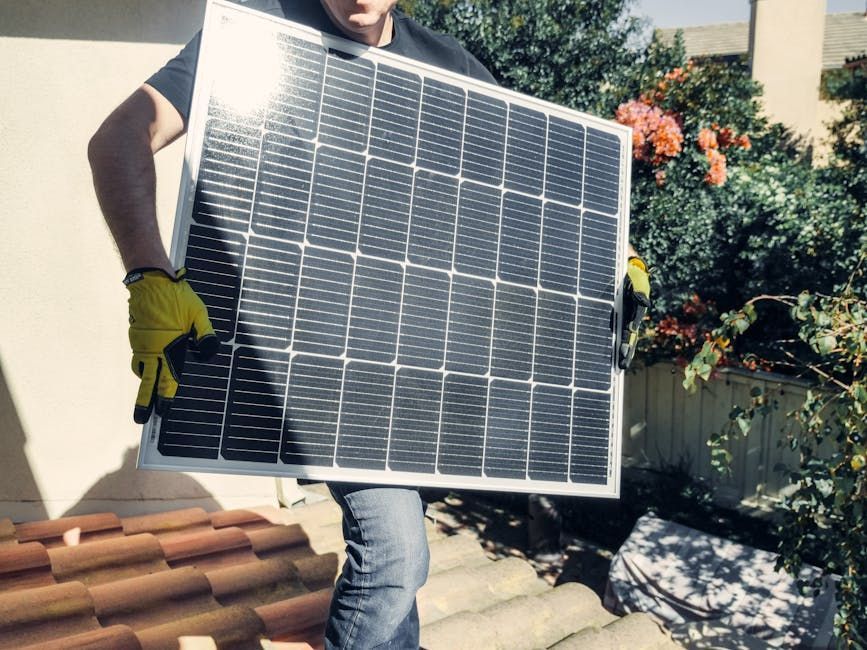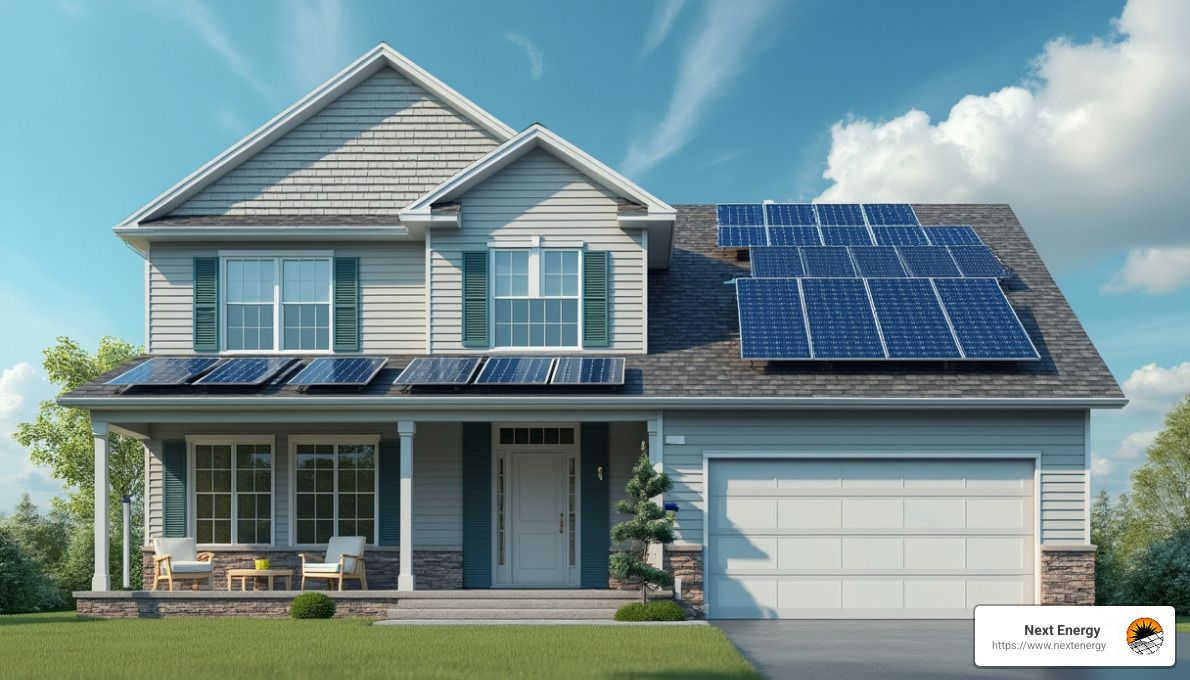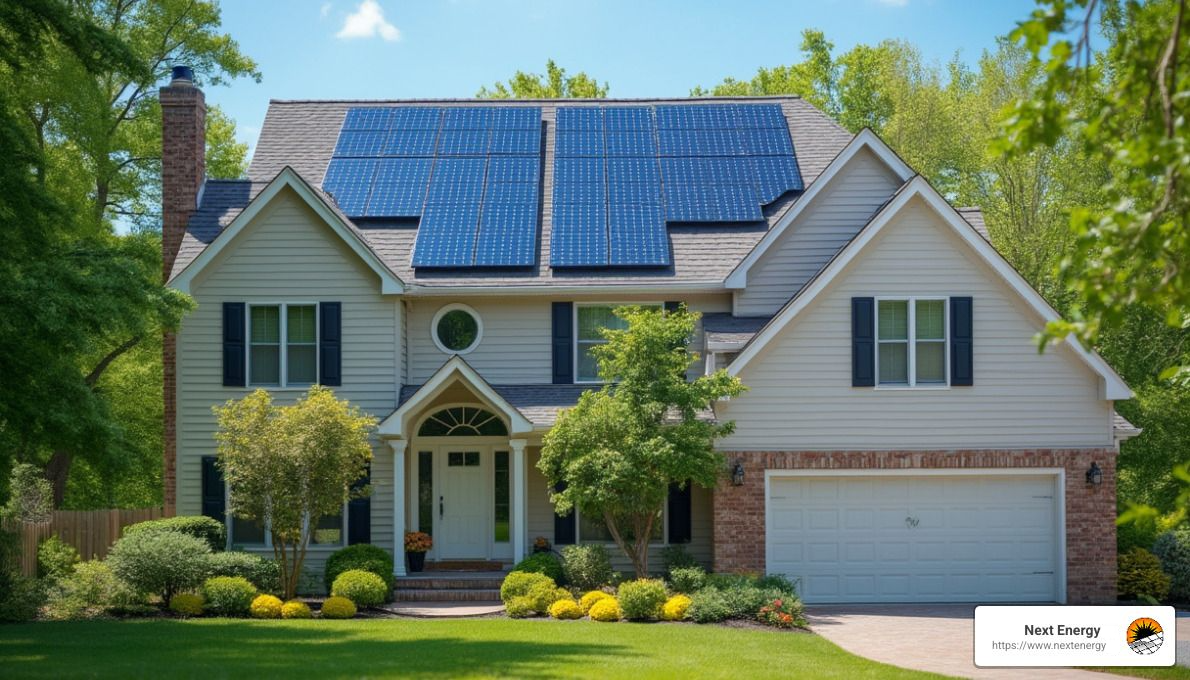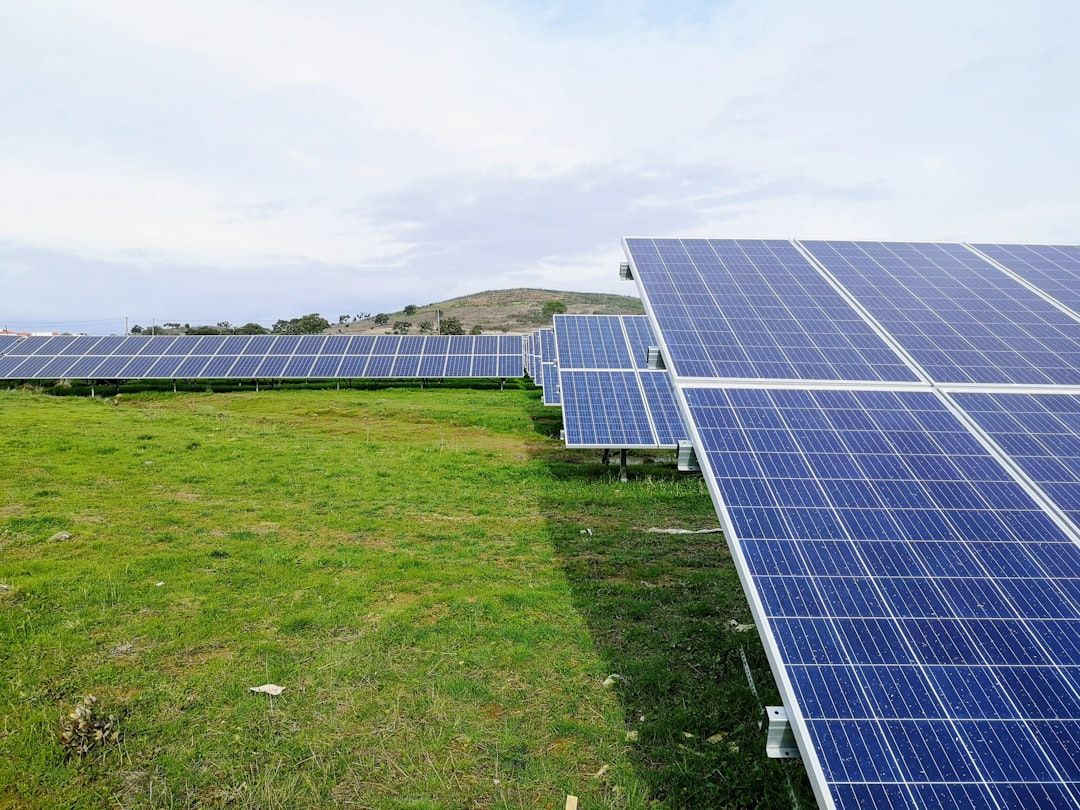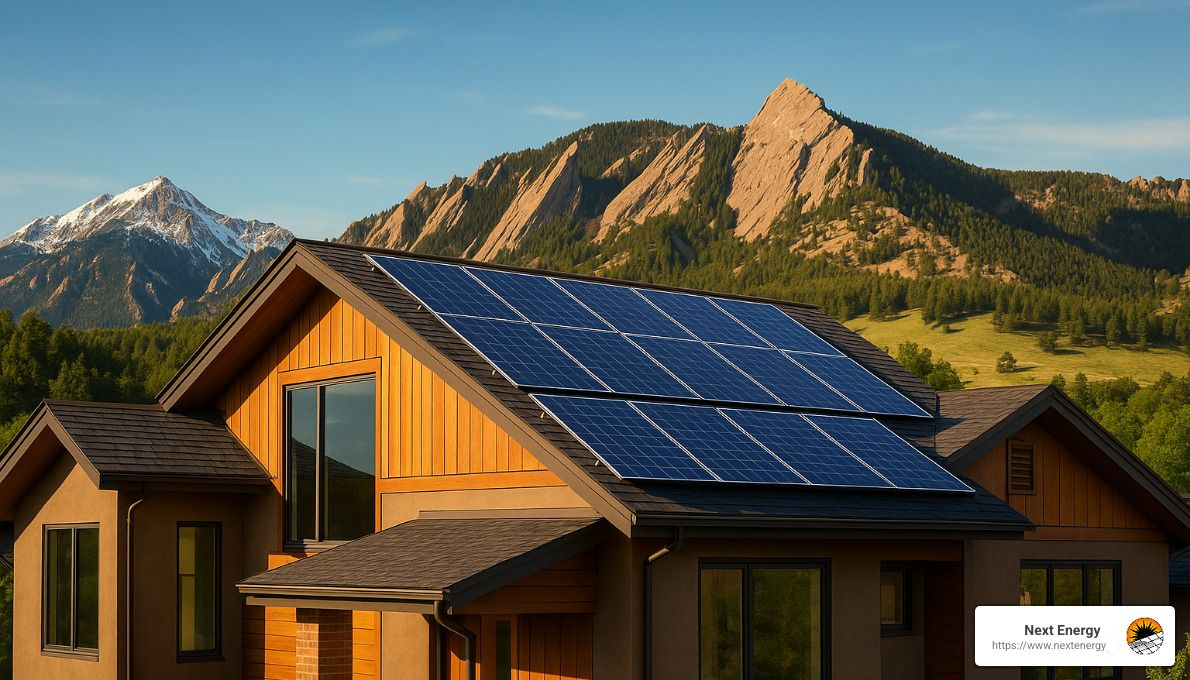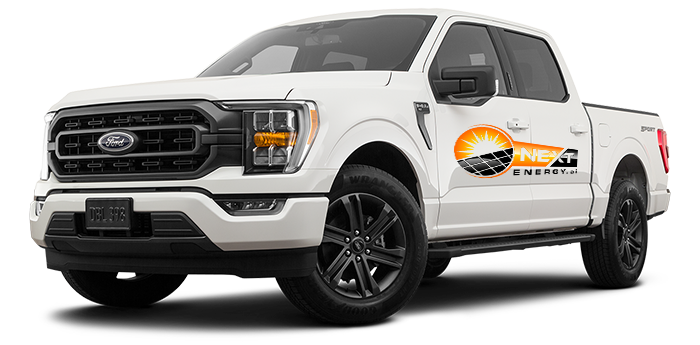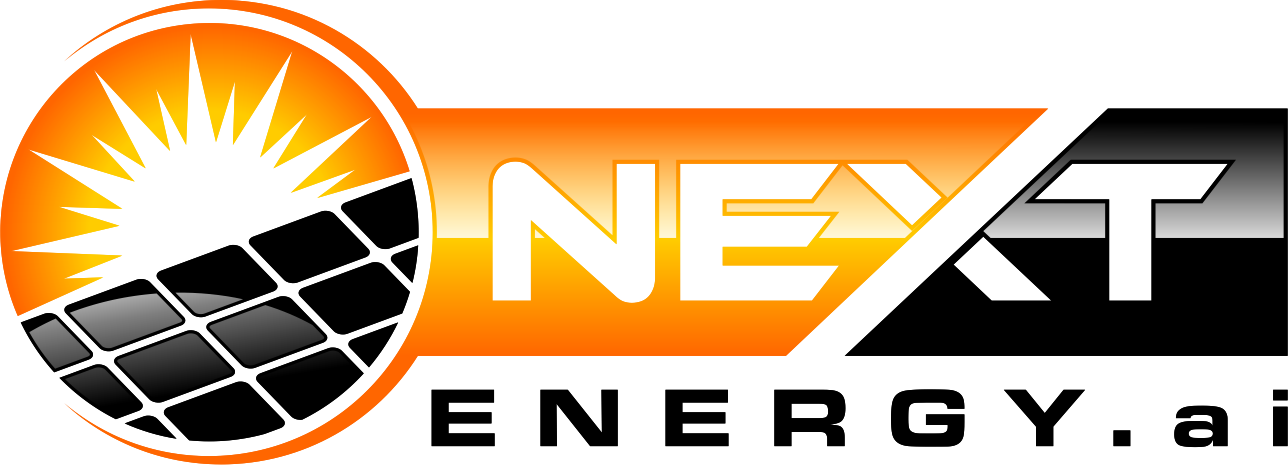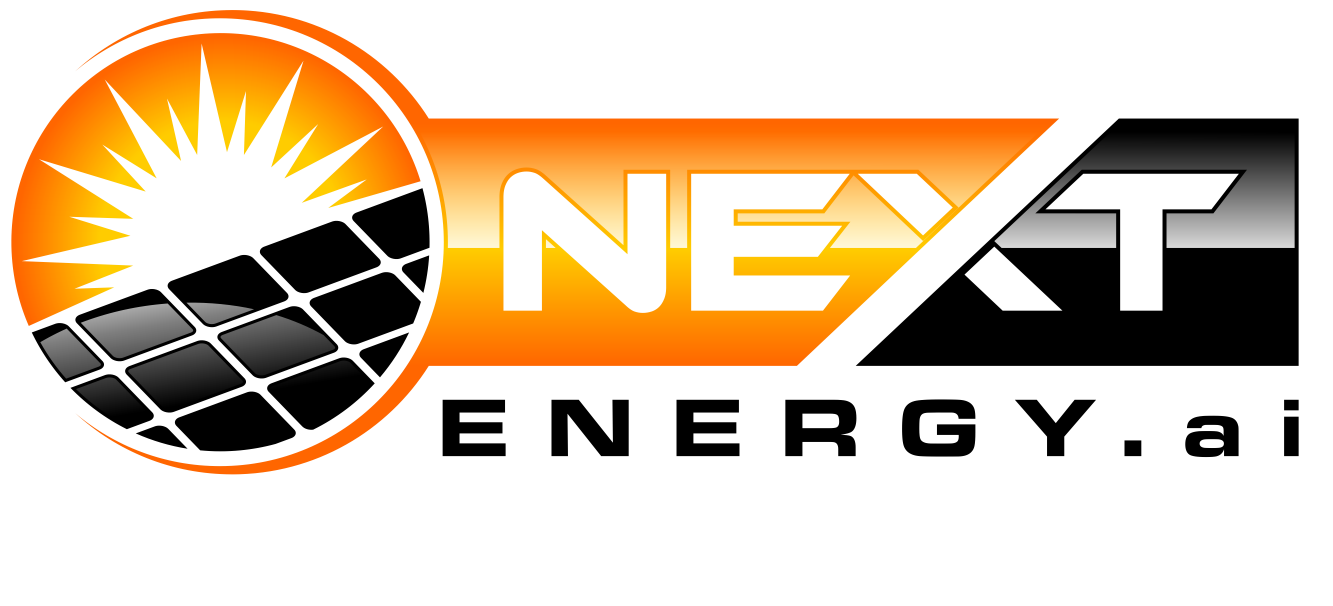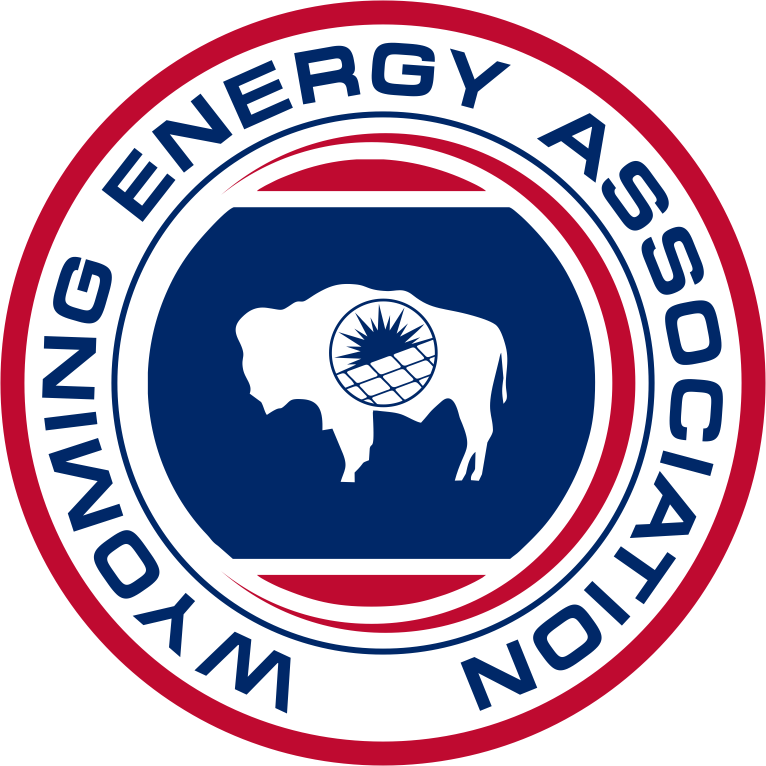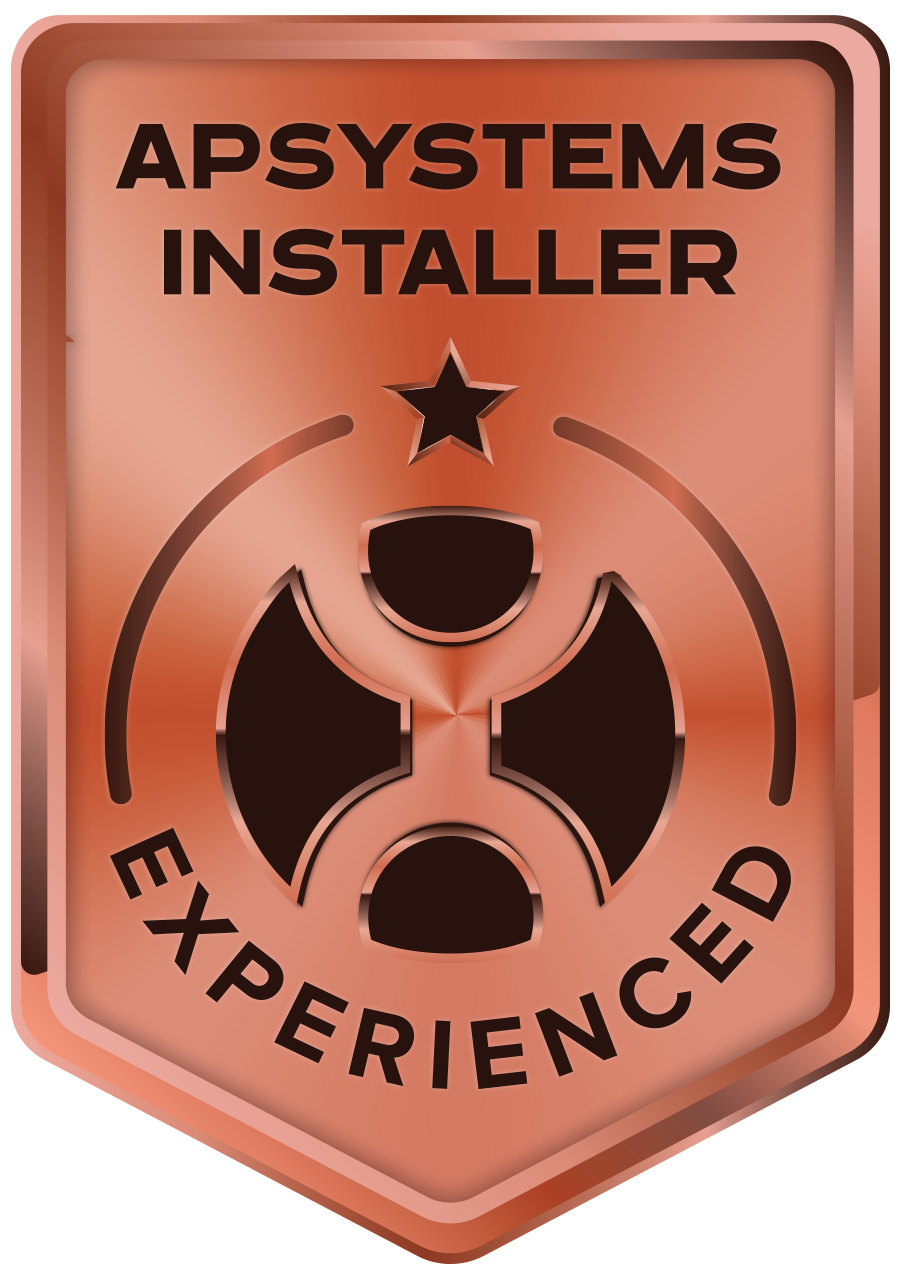Solar Savings in Highlands Ranch: What You Need to Know
Understanding Solar Panel Costs in Highlands Ranch
Solar panel cost highlands ranch typically ranges from $3.20 to $4.50 per watt in 2025, with most homeowners installing systems between 5-10 kW in size. This puts the average cost at approximately $29,000 before incentives for a standard 7.5 kW system, which drops to about $20,300 after applying the 30% federal tax credit.
Highlands Ranch residents enjoy particularly favorable conditions for solar installation:
- Over 300 sunny days per year (significantly above national average)
- Below-average electricity consumption (711 kWh/month vs. 900+ kWh U.S. average)
- Strong net metering policies allowing full credit for excess production
- State law capping solar permit fees at $500 for residential installations
These factors combine to create a typical payback period of 11-13 years for Highlands Ranch solar installations, with lifetime savings exceeding $18,000-$30,000 over a 25-year system lifespan.
The cost has become increasingly attractive as panel prices have dropped approximately 53% over the past decade, while electricity rates continue to rise. Most homeowners find that installing solar panels in Highlands Ranch is now comparable to paying their monthly utility bill, with the added benefit of eventual ownership and energy independence.
I'm Spencer Gordon, CEO of NextEnergy, with extensive experience helping Highlands Ranch homeowners steer solar panel cost highlands ranch considerations through my NAPCEP certification in photovoltaics and renewable energy.

Understanding Solar Panel Cost in Highlands Ranch 2025
Average Solar Panel Cost: Highlands Ranch vs. Colorado
When neighbors ask me about solar panel cost highlands ranch, I like to give them the real numbers. In 2025, you're looking at about $3.20 to $4.50 per watt for a quality solar installation in our community. That might seem like just numbers, but let me break down what this actually means for your home.
Location: Highlands Ranch
Cost per Watt: $3.20–$4.50
7.5 kW System (Before ITC): $24,000–$33,750
After 30% ITC: $16,800–$23,625
Location: Colorado State Average
Cost per Watt: $3.52
7.5 kW System (Before ITC): $26,400
After 30% ITC: $18,480
Location: U.S. National Average
Cost per Watt: $3.33
7.5 kW System (Before ITC): $24,975
After 30% ITC: $17,482
Source: Average Cost to Install Solar Panels in Colorado
You might notice we're a bit above the national average, but pretty much in line with Colorado prices. There's good reason for this – our local installers design systems that can handle our unique Colorado climate. We get those beautiful 300+ sunny days, but also need to account for snow loads and our altitude. This means better components and stronger mounting systems that last.
Here's something many homeowners don't realize: Colorado offers a fantastic property tax exemption on solar installations. The value your solar system adds to your home is completely exempt from property taxes. Over the years, this saves you hundreds, if not thousands, in property taxes you won't have to pay!
Per-Watt Solar Panel Cost Highlands Ranch 2025
When you see that $3.20 to $4.50 per watt figure, it covers much more than just the panels themselves. Your investment breaks down roughly like this:
About 60% goes toward the actual equipment – those sleek panels, smart inverters, and the sturdy racking system that holds everything in place. Another 20-25% covers the skilled labor needed for proper installation. The remaining costs include permits, engineering reports, and administration (10-15%) and the installer's margin which covers their warranty and ongoing support (10-15%).
If you're looking at the higher end of that price range, it usually means you're getting premium monocrystalline panels, advanced inverters with AI optimization capabilities, or you have a more complex roof layout. Those beautiful multi-level homes with dormers and multiple roof faces that make Highlands Ranch so attractive? They typically require more labor and materials.
On the flip side, if you have a simple, single-story home with a nice south-facing roof section, you'll likely fall on the lower end of the price spectrum. The good news? Even with these regional variables, solar has never been more affordable for Highlands Ranch homeowners, and the long-term savings are substantial.
Key Factors That Influence Your Total Solar Investment
When you're looking at solar panel cost highlands ranch, every home gets a unique quote. Your investment depends on several key factors that shape both the upfront costs and long-term returns.
Most Highlands Ranch homes consume about 711 kWh per month of electricity, which typically means a 6–8 kW system will cover your needs. But if you're planning to get an electric vehicle or switch more appliances to electric in the future, you might want to consider a larger system now.
One of the biggest advantages for Highlands Ranch homeowners is our incredible sunshine – with over 300 sunny days annually, your panels will produce more electricity than they would in many other parts of the country. This sunshine bonus means you can often achieve full bill offset with fewer panels than you might need elsewhere.
Panel efficiency has improved dramatically in recent years. The 450-watt panels that are now standard deliver more power in less space, which is perfect if you have limited roof area. Your roof characteristics matter too – the angle, age, material, and any shade from trees or neighboring buildings will all impact how difficult installation will be and how much power you'll generate.

Adding batteries or EV chargers increases your upfront investment but can dramatically improve your system's value over time. Batteries provide backup power during outages and let you use more of your own solar energy, while installing an EV charger now saves you from paying for separate electrical work later.
The good news about local regulations is that Douglas County and the Highlands Ranch Community Association (HRCA) cap permit fees at $500, keeping these costs predictable. Some HOAs may require an additional review, but Colorado law protects your right to install solar.
You can explore more details on our Solar Panels Highlands Ranch page to see how these factors might apply to your specific situation.
Equipment Choices & Warranties
The equipment you select significantly impacts both price and performance. Monocrystalline panels offer the highest efficiency but come at a premium price. Bifacial panels can capture reflected light from below, boosting output by 5-15% on light-colored roofs. Budget-conscious homeowners might consider polycrystalline panels, though they require more roof space for the same output.
Your inverter choice matters too. Central string inverters are the most affordable option, while microinverters optimize each panel individually – perfect for partially shaded roofs. Our AI-improved hybrid inverters take things further by intelligently managing your home's energy usage.
Most quality solar equipment comes with a 25-year warranty on panels and performance, while inverter warranties typically range from 10-25 years depending on the type. Always read the fine print – a strong warranty can save you thousands over your system's lifetime.
Site and Structural Considerations
If your roof is approaching the 15-year mark, it's worth considering a replacement before adding solar. Nothing's more frustrating than paying to remove and reinstall panels just a few years after installation.
We use advanced AI shading analysis to identify the optimal panel placement for your specific roof. Even minor shade from nearby trees or buildings can impact production, but smart design minimizes these effects.
Don't worry about Colorado's famous snow – modern solar mounting systems are engineered for our local snow loads. In fact, snow typically slides off sloped panels faster than off regular shingles, and those sunny days after snowstorms can actually boost production thanks to reflection.
Some homes, particularly older ones, may require an engineering stamp (about $500) to verify structural integrity, especially when adding heavier components like batteries. This is a crucial safety step that protects your biggest investment – your home.
Additional Upgrades That Add Cost (or Value)
Consider upgrading your electrical panel to a smart panel during solar installation. This gives you real-time energy monitoring and the ability to shift loads automatically for maximum savings – turning ordinary appliances into smart devices without replacing them.
Installing an EV charger alongside your solar system typically saves 30-40% compared to adding one later. Even if you don't have an electric vehicle yet, this future-proofs your home as transportation electrifies.
While battery storage isn't essential with Colorado's favorable net metering policies, batteries provide valuable backup power during outages. They're also becoming more financially attractive as utility rates rise and time-of-use billing becomes more common.
What makes Next Energy systems special is our AI monitoring that learns your habits and optimizes your energy usage. Our systems shift consumption to times when your panels are producing, automatically manage battery charging/discharging, and even pre-cool or pre-heat your home based on weather forecasts – all to maximize your savings without you lifting a finger.
Incentives, Rebates & Smart Financing Options
The sticker price is just the beginning—there are plenty of ways to make solar panel cost highlands ranch much more affordable. Let’s walk through how Highlands Ranch homeowners are trimming their solar costs and getting the most for their money.
Federal & State Incentives
The biggest boost comes from the 30% Federal Investment Tax Credit (ITC). This covers everything—your equipment, installation, permits, even that fancy monitoring system. For a typical $30,000 project, that’s $9,000 back in your pocket at tax time.
Colorado also steps up with the RENU Loan, a state-backed option that offers low-interest solar loans and flexible terms up to 20 years. This makes solar accessible for many homeowners who want to keep monthly payments manageable.
Here’s another perk: there’s no sales tax on your solar equipment in Colorado. And thanks to the property tax exemption, the value your panels add to your home won’t bump up your tax bill. That’s hundreds saved over the years, with no surprise hikes.
If you’re curious about every possible incentive, check out our full roundup here: Colorado Solar Energy Rebates.
How Net Metering Boosts Savings
One of the best parts of going solar in Highlands Ranch is Colorado’s 1:1 net metering policy. When your system makes more electricity than you use, the meter literally spins backward—and those extra credits roll into your account for cloudy days or winter months. Many folks end up with a monthly electric bill that’s only $10–$15—just the fee to stay connected to the grid.
And here’s a tip: while batteries aren’t required for most, they’re a smart upgrade if you want peace of mind during power outages or want to future-proof as electric rates climb. For most, though, net metering already does the heavy lifting.
Best Ways to Pay for Your System
How you pay for solar can make a big difference in both your payback time and your long-term savings. Paying cash delivers the quickest payback and maximum lifetime savings, but it’s not the only way.
Many homeowners use low-interest loans—Colorado’s RENU program and other green home loans often come in at just 3–5% interest, which can be even better than a new car loan. If you’ve built up some equity in your home, a home equity line of credit (HELOC) might score you an even lower rate.
You might see offers for solar leases or power purchase agreements (PPAs). Use caution here—these usually mean you miss out on the best tax credits and keep less of the savings over time.
Stacking Incentives for Maximum ROI
Don’t leave money on the table! The real magic happens when you stack federal, state, and local perks together. Even if you live in an HOA, Colorado law protects your right to install solar—and permit fees can’t go above $500 for residential systems, thanks to state legislation.
If you’re wondering how big a system you’ll need, here’s a quick reference: the average Highlands Ranch household uses 711 kWh/month. Most folks opt for systems in the 6–8 kW range.
Ready to see what your incentives and options look like? Explore the details on our Colorado Solar Energy Rebates page. Taking advantage of these incentives makes solar panel cost highlands ranch much more manageable—and sets you up for decades of clean, affordable energy.
Payback Period & Long-Term Savings Forecast
The real magic of solar happens in the long run. For most of our Highlands Ranch neighbors, the system pays for itself in about 11-13 years. After that? It's all money in your pocket.
Your total 25-year savings typically range from $18,000 to $30,000 depending on your system size and how quickly utility rates climb (spoiler alert: they always climb). And don't forget about home value—properties with solar systems tend to sell about 4% higher and spend less time on the market when you decide to move.
Today's solar panels are built to last. Modern panels degrade just 0.5% annually, meaning after 25 years, they'll still produce at least 88% of their original output. That's impressive staying power for any investment!
Living in Colorado gives us a distinct advantage with our 300 sunny days per year. Even during winter months, your system keeps generating, shortening your payback period compared to cloudier regions.

Calculating Your Personal ROI
Your actual return depends on several factors unique to your home. We typically design systems to offset 90-110% of your annual electricity usage. While your solar panel cost highlands ranch investment is fixed, traditional electricity rates increase 2-4% annually—every year those increases make your solar decision look smarter.
If you're considering battery storage, it adds upfront cost but can improve your self-consumption ratio, especially valuable as net metering policies evolve over time.
Let me share a quick success story: One of our Highlands Ranch customers installed an 8.4 kW system for $21,000. After applying the 30% federal tax credit, their net investment dropped to $14,700. Their monthly electric bill went from $120 to just a $10 grid connection fee—achieving full payback in under 12 years with estimated lifetime savings of $24,000. That's real money that stays in their family budget!
Strategies to Speed Up Break-Even
Want to reach profitability even faster? Start by making your home more efficient. Insulate, seal leaks, and swap to LED lighting before sizing your system. This allows you to install a smaller system while achieving the same bill reduction.
If you're thinking about buying an electric vehicle in the next few years, consider oversizing your system now. Adding extra panels during initial installation costs significantly less than adding them later, and you'll be ready when that EV arrives in your garage.
Our AI-optimized systems include seasonal angle adjustments that maximize production when you need it most. These smart tweaks ensure your panels capture more winter sun, when electricity rates often spike due to heating needs.
Every kilowatt-hour your system produces is one you don't have to buy from the utility—and that's a winning formula for decades of savings.
Choosing an Installer & Avoiding Common Pitfalls
Finding the right solar installer can make all the difference between decades of worry-free energy production and years of headaches. When researching solar panel cost highlands ranch, don't forget that the installer you choose matters just as much as the equipment.
I've seen too many Highlands Ranch homeowners regret going with the cheapest bid or a slick sales pitch. Your solar system is a 25+ year investment, so choosing a company that'll be around to honor those warranties matters tremendously.
Local expertise makes a world of difference. Companies based in Colorado understand our unique weather patterns, from heavy snow loads to intense summer sun. They've steerd Douglas County's permitting process countless times and know the quirks of various Highlands Ranch HOA design guidelines.
We've noticed that employee-owned firms tend to deliver better service because the installers working on your roof have skin in the game. When technicians have ownership stakes, they care more about quality work and long-term customer satisfaction.
Be cautious about door-to-door sales operations. Many of these companies subcontract installation work, then disappear when warranty issues arise. I've heard from several Highlands Ranch homeowners who couldn't reach their installer when panels stopped producing—leaving them with expired permits and no recourse.
Always double-check that both product and labor warranties are clearly spelled out. The industry standard is 25 years for quality providers, covering both equipment and workmanship. Get this in writing!
You can learn more about our detailed approach on our Solar Panel Installation page.
What to Look for in Highlands Ranch Installers
When comparing local companies for your solar panel cost highlands ranch project, prioritize those with NABCEP certification. This is the gold standard in the solar industry—like board certification for doctors. It means your installer has proven expertise in designing and installing photovoltaic systems.
A BBB A+ rating isn't just a nice badge—it reflects a company's commitment to resolving customer issues. Check how they've handled complaints, not just the overall score.
Companies with a local warehouse offer major advantages. When an inverter needs servicing or a panel gets damaged, you won't wait weeks for parts to ship from across the country. Local warehousing also means lower shipping charges and faster repairs when something goes wrong.
Common Mistakes & How to Dodge Them
I've seen homeowners make the same costly mistakes over and over again. Don't be one of them!
Never pay in full before PTO (Permission to Operate). Some companies request final payment before your utility has officially approved your system to connect to the grid. This removes their incentive to quickly complete the final steps of your project. Always tie final payment to that crucial PTO document.
Another painful lesson: don't ignore needed roof repairs. Installing solar on a roof that needs replacing in 5-7 years means you'll pay double later—once to remove the panels, again to reinstall them after roof work. Better to handle roofing issues first.
Finally, always compare multiple quotes from reputable local installers. Look beyond just the bottom-line price—compare equipment quality, warranties, and customer reviews. A slightly higher upfront cost often means better components and service that will pay dividends over your system's 25+ year lifespan.
As one Highlands Ranch homeowner told me recently: "After a neighbor waited 15 weeks for a national chain to finish their system, we chose a local Highlands Ranch team and were up and running in just 40 days!" That time difference means thousands in lost savings and tax credits.
Environmental & Community Benefits
Going solar in Highlands Ranch isn't just about saving money—it's about creating a better place to live for you and your neighbors. When you install panels on your roof, you're making a real difference right here in our community.
A typical 7.5 kW system in Highlands Ranch offsets about 4.2 tons of carbon dioxide annually—that's like planting over 100 trees every year without lifting a shovel! I've watched homeowners beam with pride when they see their energy production app showing exactly how much pollution they've prevented.
Cleaner air is something we all benefit from. With less reliance on fossil fuels, we reduce the pollutants that contribute to those hazy days along the Front Range. Your solar investment helps everyone breathe a little easier.
Grid resilience becomes increasingly important as our community grows. During those scorching summer days when air conditioners strain the grid, your solar panels are working at peak production—exactly when the system needs it most. You're helping prevent brownouts and stabilizing electricity for everyone.
When it comes time to sell, homes with solar systems are increasingly attractive to buyers. They typically sell faster and command a premium price—buyers understand the value of moving into a home with locked-in energy costs. I've had customers tell me their solar system was the feature that sealed the deal when selling their home.
Local Regulations & HOA Considerations
Navigating solar panel cost highlands ranch means understanding the local rules, but fortunately, they're quite solar-friendly:
Douglas County has streamlined their permitting process, keeping it transparent and adhering to the $500 state-mandated fee cap. This predictability makes planning your project much easier.
The Highlands Ranch Community Association (HRCA) does require pre-approval for solar installations and will review your panel color and placement. But here's the good news: Colorado state law prevents HOAs from prohibiting solar installations outright. They can have reasonable aesthetic guidelines, but they can't say no to your clean energy dreams.
House Bill 21-1284 further strengthened solar access for all Colorado homeowners, ensuring fair and affordable permitting across the state. This legislation was a big win for homeowners wanting to take control of their energy future.
Future-Proofing With AI-Driven Energy Management
At Next Energy, we're taking solar beyond simple electricity generation. Our systems use advanced machine learning to make your panels smarter every day they're on your roof.
Smart forecasting means your system learns your family's unique energy habits. If you typically run the dishwasher at 8 PM, our AI might suggest shifting that to 2 PM when your panels are producing excess power. These small adjustments add up to significant savings over time.
Intelligent load management prioritizes your most important appliances during peak solar production. Your EV can charge when the sun is brightest, while less critical tasks wait their turn—all happening automatically in the background.
Perhaps most impressive is how our systems handle weather resilience. Colorado's famous 300 sunny days are wonderful, but what about those other 65 days? Our AI adapts to storms, snow, and seasonal changes without you having to babysit the system. When snow slides off your panels (which happens faster than from regular roofing, thanks to their smooth surface and angle), the system immediately optimizes production.
Want to learn more about how solar power works throughout Colorado's unique climate zones? Visit our detailed guide to Solar Power Colorado.
I've watched homeowners' faces light up when they see how these smart systems work—there's something deeply satisfying about producing your own clean energy and using it intelligently. Your home becomes not just a consumer of electricity, but a sophisticated participant in our energy future.
Frequently Asked Questions about Solar Panel Cost Highlands Ranch
How Does Highlands Ranch Pricing Compare to Denver and National Numbers?
When comparing solar panel cost highlands ranch to other areas, you'll find we're typically $0.10-$0.30 per watt higher than the national average. This isn't because local installers are gouging you! It reflects our region's commitment to premium equipment that stands up to Colorado's unique climate, plus the slightly higher labor rates our skilled local technicians command.
The good news? Even with this modest premium, Highlands Ranch homeowners often see faster payback periods and higher lifetime savings than the national average. Why? Our abundant sunshine (those glorious 300+ sunny days) and relatively modest electricity usage mean your system produces more while needing to offset less.
What Maintenance Costs Should I Expect Over 25 Years?
One of solar's hidden perks is how little maintenance these systems need. Your panels are essentially sitting there quietly, making you money with almost no intervention needed. Most maintenance involves simply keeping them clean – typically an annual rinse with a garden hose or brushing off snow after heavy storms.
For budgeting purposes, set aside about $200-$300 every five years for a professional inspection or system checkup. This preventative care helps catch any potential issues before they affect performance. The best part? Most substantial repairs are completely covered under your 25-year warranty, so unexpected costs are rare. Your inverter might need replacement after 12-15 years if you opt for a string inverter system, but microinverters and optimizers typically carry warranties matching your panels.
Are Solar Panels Still Worth It If I Plan to Sell My Home in 7–10 Years?
Absolutely yes! This is actually one of the smartest financial moves you can make. Solar increases your home's market value by approximately 4% – which often exceeds your out-of-pocket installation costs after incentives.
Beyond the pure numbers, solar-equipped homes typically sell faster than comparable non-solar properties. Today's homebuyers are increasingly energy-conscious and love the idea of moving into a home with locked-in low energy costs. As electricity rates continue their upward march (they've risen about 3% annually for decades), the value proposition of your solar system becomes even more attractive to future buyers.
Many of our Highlands Ranch customers have shared that their solar systems became major selling points when they decided to move. One customer told us: "The young couple who bought our home said the solar system was what made them choose our house over three others in the neighborhood. They loved that their energy bills would be predictable for decades."
Even if you're not planning to stay in your home for the full payback period, solar remains an excellent investment that you'll likely recoup entirely when you sell – plus you'll enjoy lower electric bills every month until then!
Want to explore how solar could work for your specific situation? Visit our Highlands Ranch solar hub for a free AI-improved quote custom to your home's unique characteristics.
Conclusion
Let's be honest – installing solar in Highlands Ranch isn't just a smart financial move, it's a gift to your future self. As I've walked hundreds of homeowners through this journey, I've seen how the right solar system transforms both homes and lives.
With Colorado's incredible 300+ days of sunshine, Highlands Ranch residents are perfectly positioned to maximize their solar investment. The numbers tell the story: solar panel cost highlands ranch figures show payback periods of 11-13 years, with lifetime savings that typically exceed $18,000-$30,000. Those aren't just numbers – that's college tuition, dream vacations, or a comfortable retirement cushion.
What makes this moment so perfect? The 30% federal tax credit won't last forever. Utility rates continue their upward march (they've risen over 30% in the last decade alone). And our AI-optimized systems are squeezing more value from every ray of sunshine than was possible even five years ago.
The Next Energy difference comes down to three things: local expertise, cutting-edge technology, and genuine care for your long-term satisfaction. We're your neighbors, not a faceless national chain. We understand Highlands Ranch weather patterns, HOA requirements, and the unique challenges of Colorado's climate.
Our AI-improved monitoring doesn't just track your system – it learns your habits, predicts your needs, and maximizes your savings. While traditional solar is like having a fuel-efficient car, our systems are more like having a car that knows when gas prices will drop and fills up at exactly the right moment.
Ready to see what's possible for your home? Visit our Highlands Ranch solar hub for a free AI-improved quote. In just a few minutes, you'll see exactly how much you could save and what energy independence really looks like for your family.
Want to learn more before taking the next step? Explore our resources:
- Average Cost to Install Solar Panels in Colorado
- Solar Panels Highlands Ranch
- Colorado Solar Energy Rebates
- Solar Panel Installation
- Solar Power Colorado
Let's power Highlands Ranch—smarter, together.
The sun is shining. The technology is ready. Your energy independence awaits.
